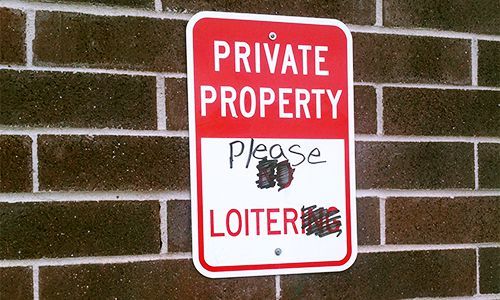California Penal Code § 647(h) makes it a crime to loiter on someone else’s property with the intent to commit a crime. The section applies to anyone “who loiters, prowls, or wanders upon the private property of another, at any time, without visible or lawful business with the owner or occupant.”
Violations are misdemeanors. The offense is considered a form of disorderly conduct.
1. What is illegal loitering?
To make a case under Penal Code 647(h), a prosecutor must prove that you:
- delayed, lingered, prowled, or wandered on someone else’s property
- had no lawful purpose for being there,
- intended to commit a crime if the chance arose, and
- were on the property for the purpose of committing a crime if the chance arose.1
All four facts must be proven beyond a reasonable doubt. Under California loitering laws, merely lingering in one spot is a crime.2 You have to be on the property for the purpose of doing something illegal. Moreover, to make a lawful arrest, police need probable cause to believe that you are seeking to commit a crime.
2. What does “without a lawful purpose” mean?
Loitering is only a crime under PC 647(h) if it is done for an unlawful purpose. If you are lingering somewhere with a lawful purpose, it is not a crime.
The context will dictate when a purpose for lingering is a lawful one. Examples of a lawful purpose include:
- Walking down the street, gazing in storefronts,
- Leaning on a fence to watch a Little League baseball game, or
- Standing near the side of the road to take photos of a sunset.

California Penal Code 647(h) is the state’s loitering statute.
Only slightly different scenes can turn a lawful purpose into a seemingly unlawful one:
- Walking up and down the street, intently peering into the front of a single store that is about to close,
- Loitering at a school watching children play at recess, or
- Standing near the side of the road to take photos of a nuclear power plant, using a telescopic lens.
Police only need probable cause to apprehend you for loitering. They can make an arrest if they suspect you are plotting a crime.
3. What are some examples?
- Waiting in a parked car for an hour behind a gas station, and then running when the police arrive,3
- Standing at a street corner known for drug deals for over 30 minutes, and
- Sitting on a park bench, watching the activity at one particular house.
4. Are there related offenses?
647h PC is often filed together with other criminal charges. Some of these include:
- drug possession (Health and Safety Code 11350 HS). When police suspect you of loitering, they arrest and search you. If they discover narcotics, it can spawn a drug possession charge.
- carrying a concealed weapon (Penal Code 25400 PC). The search that comes with an arrest for loitering can also lead to evidence of a gun crime.
- trespassing (Penal Code 602 PC). Loitering arrests frequently happen on private property. If the property owner did not give you permission to be there, trespassing charges can follow.
5. What legal defenses can be asserted?
If you are accused of loitering under PC 647(h), you have legal defenses you can raise. Some of the most common include showing that:
- There was no probable cause,
- There was a lawful purpose, and
- The accusations were false.
Police need probable cause to believe that you are seeking to commit a crime. If they lack probable cause, detention and arrest for loitering violates the Fourth Amendment. Any evidence found as a result of the arrest will be excluded from court. This can doom all of the criminal charges stemming from the arrest, including those that are more severe than the loitering allegation.
If you had a lawful purpose for your actions, you can explain this to defend against a charge for loitering. This can prevent a prosecutor from proving that you were lingering for an unlawful reason.
Many loitering accusations are false. They come from people who have an ulterior motive for calling the police. Sometimes they are done out of revenge. Evidence that the accuser had an ulterior motive for calling the police can undermine a loitering case.
6. What are the penalties?
Violations of Penal Code 647 Section (h) are misdemeanors. The penalties for a conviction include:
- Up to $1,000 in fines, and/or
- Up to 1 year in county jail.
This is in addition to the penalties of any related charges that have also been filed.
Legal References:
- California Criminal Jury Instructions CALCRIM 2915.
- In re Cregler, 56 Cal.2d 308 (Cal. 1961) (“Loitering as forbidden includes waiting, but mere waiting for any lawful purpose does not constitute such loitering”).
- People v. Migliaccio, No. G038047 (Cal. App. 2008).
